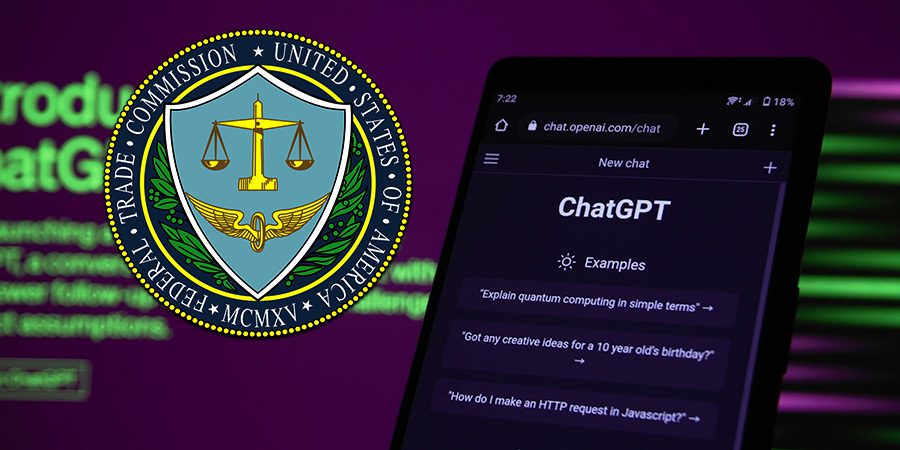In this article, we’ll look at the reasons behind the recent complaint filed by the Center for AI and Digital Policy (CAIDP) against OpenAI, arguing that the company’s GPT-4 model violates the Federal Trade Commission (FTC) rules against unfair and deceptive practices.
Key Takeaways:
- AI Policy group CAIDP filed a complaint against OpenAI, stating GPT-4 violates FTC rules
- The complaint follows a high-profile open letter calling for a pause on large generative AI experiments
- CAIDP highlights potential threats from GPT-4, including malicious code, tailored propaganda, and biased training data
- The complaint seeks to hold OpenAI liable for violating Section 5 of the FTC Act
- CAIDP urges the FTC to halt further commercial deployment of GPT models and require independent assessments
The Complaint Against OpenAI
The CAIDP, an organization focused on AI ethics, has accused OpenAI of violating consumer protection rules.
They claim that OpenAI’s release of AI text generation tools, like the GPT-4, is biased, deceptive, and poses a risk to public safety.
This bold move from the CAIDP has garnered attention from the AI community, raising questions about the future of AI development and how it should be regulated.
The complaint was filed following a high-profile open letter that called for a pause on large generative AI experiments.
This letter was signed by numerous AI researchers and tech luminaries, including OpenAI’s co-founder Elon Musk.
The CAIDP’s complaint echoes the letter’s call for slowing down the development of generative AI models and implementing stricter government oversight.
Potential Threats from GPT-4
The CAIDP’s complaint brings attention to the potential dangers of OpenAI’s GPT-4 generative text model, which was announced in mid-March.
Some of these threats include the possibility of GPT-4 producing malicious code and highly tailored propaganda and the risk of biased training data resulting in unfair race and gender preferences in various applications, such as hiring.
One of the major concerns is the potential privacy failures with OpenAI’s product interface.
A recent bug exposed OpenAI ChatGPT histories and possibly payment details to other users, highlighting the need for stronger privacy measures.
The CAIDP argues that GPT-4 crosses a line of consumer harm that should draw regulatory action.
They believe that OpenAI should be responsible for breaking the FTC Act’s Section 5, which says it’s wrong to be unfair or dishonest when doing business.
The watchdog claims that OpenAI released GPT-4 for commercial use, knowing full well the risks involved, including potential bias and harmful behavior.
Demands from the CAIDP
In its complaint, the CAIDP calls on the FTC to halt any further commercial deployment of GPT models and require independent assessments of these models before any future rollouts.
They also ask for a publicly accessible reporting tool, similar to the one that allows consumers to file fraud complaints.
Furthermore, the AI watchdog seeks firm rulemaking on the FTC’s guidelines for generative AI systems, building on the agency’s ongoing but still relatively informal research and evaluation of AI tools.
FTC’s Interest in AI Regulation
The CAIDP’s complaint comes at a time when the FTC has shown increasing interest in regulating AI tools. In recent years, the agency has warned that biased AI systems could draw enforcement action.
And during a joint event with the Department of Justice, FTC Chair Lina Khan stated that the agency would be looking for signs of large incumbent tech companies trying to lock out competition.
Investigating OpenAI, one of the major players in the generative AI race, would mark a significant escalation in the FTC’s efforts.
With the growth of AI and the potential risks associated with it, the FTC’s involvement is considered crucial to ensuring consumer protection and maintaining a healthy competitive landscape.
The FTC’s interest in AI regulation highlights the need for a comprehensive approach to addressing the challenges posed by rapidly advancing AI technologies.
From privacy concerns and data security to bias and fairness, the agency’s involvement could pave the way for more stringent policies and robust regulatory frameworks.
Moreover, the FTC’s potential investigation into OpenAI’s GPT-4 model might set a precedent for future AI development and deployment.
The case could help define the boundaries for AI applications, ensuring that they are developed and used responsibly, without causing harm to consumers or society as a whole.
Conclusion
The CAIDP’s complaint against OpenAI is a wake-up call for the AI community, shedding light on the potential risks and ethical dilemmas surrounding powerful AI tools like the GPT-4.
The watchdog’s demands for greater transparency, independent assessments, and enhanced privacy measures underscore the need for a balanced approach to AI development.
As the FTC takes a more active role in AI regulation, it will be interesting to see how the case against OpenAI unfolds and what impact it will have on the broader AI industry.
With the stakes being incredibly high, both for AI developers and society at large, the decisions made in this case could shape the future of AI for years to come.
 Sections of this topic
Sections of this topic
















